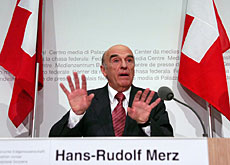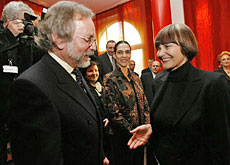Swiss refuse to budge on corporate taxes

Switzerland has rejected criticism from the European Commission of corporate tax rates in some cantons, saying it will not yield its sovereignty over this issue.
On Tuesday, the commission called on the Swiss to amend their fiscal policy and negotiate with the European Union, a demand that drew fierce reactions from Swiss politicians and business leaders.
Finance Minister Hans-Rudolf Merz shot down the EU proposal, saying in Bern that there was nothing to negotiate.
He called the commission’s decision to push for talks unfounded. In his view, there are no contractual regulations between Switzerland and the European Union that require the harmonisation of company taxation.
The 1972 trade agreement invoked by Brussels also fails to deal with fiscal matters according to Merz, and is only applicable to certain categories of goods. The finance minister said it does not provide a sufficient legal basis to decide whether cantonal and local corporate taxes can distort competition.
Merz also pointed out that Switzerland is not part of the European interior market, even though the EU is trying to impose its own rules on competition and state subsidies, calling it “unacceptable”.
State subsidy
The commission wants the Swiss to change tax rules that it claims offer unfair advantages to firms operating out of Switzerland. It said low corporate taxes offered by cantons such as Obwalden and Zug violated a 1972 trade agreement, calling it a disguised state subsidy.
“Switzerland enjoys the benefits of privileged access to the [European Union] internal market,” said EU external relations commissioner Benita Ferrero-Waldner on Tuesday.
“The decision the commission has taken is not about tax competition but about state aid undermining the level playing field necessary for our partnership and the trade relations between Switzerland and the EU.”
The commission said the system allowed companies based in Switzerland to enjoy tax breaks on profits generated inside the EU, at an estimated cost of around SFr3 billion (€1.85 billion) annually.
So far, the union is not threatening sanctions, but has warned of unilateral trade and commercial restrictions that could affect the Swiss for whom the EU is their biggest trading partner.
Merz said he does not fear a backlash from Brussels since so far all the talk is about negotiations. He reckons that sanctions are also unlikely, as some EU member states would probably not back them.
The finance minister admitted though that the European initiative was aimed at stopping firms – and their tax money – leaving the union for Switzerland’s greener pastures.
Hot topic
The tax dispute remains a hot political issue in Switzerland and the EU’s decision drew sharp reactions from three of the four parties in the government.
The rightwing Swiss People’s Party described the Commission’s decision as unwarranted interference in Switzerland’s internal affairs. It also rejected the possibility of opening negotiations on cantonal tax policies with the EU.
The secretary of the centre-right Christian Democratic People’s Party, Reto Nause, also said the tax issue should not be up for debate and the centre-right Radicals said Brussels was picking on Switzerland to make up for its own failings.
But the Social Democrats spokesman Jean-Yves Gentil said his party opposed unfair tax competition and would be prepared to discuss the issue of tax deals with the EU.
Cantonal finance ministers spoke up, saying that the union lacked a strong legal position to make its claims. Zug’s treasurer added that proof of this was that attacks on Switzerland’s corporate tax structure were becoming more political.
For economiesuisse, the Swiss Business Federation, calling into question the 1972 trade agreement is legally unacceptable, and can only damage business and financial interests.
swissinfo with agencies
Selected cantonal corporate tax rates (federal, cantonal and municipal) from a KPMG report published in November 2006: Obwalden 13.1% of operating income, Schwyz 15.6%, Zug 16.4%, Zurich 21.3%, Graubünden 29.1%. Swiss average 21.3%.
Business tax rates in other countries: Japan 40.7%, US 40%, Germany 38.3%, Republic of Ireland 12.5%, Cyprus 10%.
Article 23.iii of the 1972 Free Trade Agreement states that: “any public aid which distorts or threatens to distort competition by favouring certain undertakings or the production of certain goods” is “incompatible with the proper functioning of the Agreement”.
The 1972 accord exclusively governs the trading of certain goods (industrial and agricultural processed products).
Switzerland argues that the procedures for taxing management companies, mixed companies and holding companies in the country do not fall within the scope of the 1972 free trade agreement.

In compliance with the JTI standards
More: SWI swissinfo.ch certified by the Journalism Trust Initiative













You can find an overview of ongoing debates with our journalists here . Please join us!
If you want to start a conversation about a topic raised in this article or want to report factual errors, email us at english@swissinfo.ch.